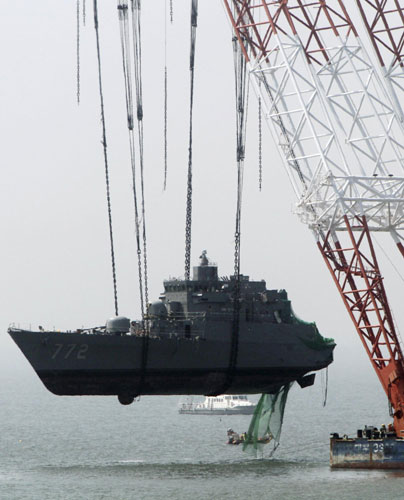Asia-Pacific
SKorea hoists 2nd half of sunken warship from sea
(Agencies)
Updated: 2010-04-24 16:44
 |
Large Medium Small |
SEOUL, South Korea - South Korea lifted the second half of a sunken warship from waters near the disputed sea border with the Democratic People's Republic of Korea (DPRK) on Saturday, a month after a mysterious explosion split apart the ship and left 46 sailors dead or missing.
A huge floating crane loaded the bow onto a barge in the Yellow Sea, and the military was looking for missing sailors inside the wreck, Seoul's Joint Chiefs of Staff said.
The barge would then take the ship to a naval base south of Seoul for an investigation with foreign experts. The stern of the 1,200-ton Cheonan had been salvaged last week and moved to the same base.
 |
|
A part of the sunken South Korean naval vessel Cheonan is lifted by a giant crane off Baengnyeongdo island, near the maritime border with North Korea, northwest of Seoul, April 24, 2010. [Photo/Agencies] |
The Cheonan was on a routine patrol March 26 when the explosion split apart the ship, and 58 crew members were rescued shortly afterward. Forty bodies have been recovered so far, and six sailors still are missing.
The sinking, one of South Korea's worst naval disasters, happened near the two Koreas' disputed western sea border _ a scene of three bloody inter-Korean naval battles.
South Korea has said all possibilities will be examined in the investigation and has not directly blamed the DPRK for the explosion. The DPRK has denied involvement, but suspicions have been fueled by the chief investigator's early finding that the explosion appeared to have been external, rather than on board the ship.
Meanwhile, Stephen Bosworth, President Barack Obama's special envoy on DPRK, said multilateral engagement with DPRK remains essential for progress on denuclearization despite suspicions regarding the sinking.
"We of course face a set of uncertainties in the short-term as we await the results of the investigation of the sinking of the South Korean naval vessel," Bosworth said. "But looking beyond that I think that there is reason to believe that multilateral engagement remains the essential condition for making progress on greater stability, denuclearization, peace and prosperity on the Korean peninsula."






